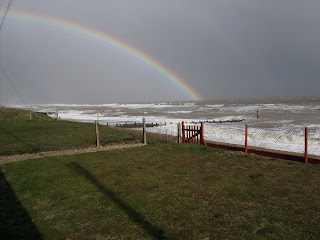The
Library Routes project is encouraging information professionals/librarians to share their history and thoughts on how they got to where they are today. I read a few and was a bit put off by comments about how surely everyone just fell into the role and only oddballs would want to be librarians from childhood. While I agree I didn't know that I wanted to be a librarian from childhood, or what it involved, certainly from a young age I wanted to work in libraries and then, when I discovered them, in archives.
 |
| Grimsby Central Library |
I even did one week of my school work experience in
Grimsby Central Library and one week in the archives. Although it doesn't look the nicest of places I loved my experience there (except the day I was on the tourist information desk - at 15 I knew nothing about anything outside the town centre!) I assumed librarians shelved and issued books, as they were my main tasks, cataloguing and classifying were unknowns, as were automated library systems. Even my school careers cascaid form (anyone else remember those - you answered questions about whether you wanted to work outside, with people, wearing shoes, swinging from chandeliers - or what seemed like equally pointless questions - and then you got a print out of your future career options) came out on top with LIBRARIAN, followed by cartographer (!!).
I did not bow to the inevitable though as I had a greater love for ancient history and classical literature. So I set off to University to study Classical Studies at
Lampeter, the place is relevant to my career development, honestly, and not just a plug for a university where I had a great time and learnt alot. At the end of 3 years, and armed with a humanities degree, I was told by the careers service that the best option was teaching. As both my parents were teachers there was no way I was going in that direction.
So now started the idea of a career as an archivist. I had my place, just needed 1 year of experience. I failed to get a traineeship (even after 3 interviews in Oxford) and could only find volunteer work, which I couldn't afford to take. So I switched to librarianship, had the experience already and chose
Aberystwyth for a number of good and bad reasons. Lampeter was not an easy place to get out of and Aber was just up the road for looking around. I had got my archive place there and they didn't make you go for an interview. I liked the variety of the set modules and the historical/rare book optional course. I suppose what clinched it, apart from being back by the sea, was the full bursary I received.
A year on, I was now armed with a Masters in Librarianship and the job hunting started. I was not really very systematic and applied for anything going that said it was suitable for newly qualified librarians. After what felt like hundreds of applications, but only 3 interviews, I got my first professional position at Nene College of Higher Education, now
University of Northampton. I was the Assistant Systems librarian it was a steep learning curve as I was faced with the Talis library management system, cd-rom networks (the future of electronic resources!!) and then the start of web pages. I was only there just over a year but thanks to their excellent training programme I obtained my Library Association chartership. The IT stuff I learnt has been a benefit for the rest of my career although I have never gone back into direct systems support.
Next I moved to Cambridge (where I still am but not in the same post) as Assistant Librarian: Reader Services at
Gonville & Caius College Library. This job asked for someone preferably with a science degree. I did not have one but it did not put me off. I was asked why I applied at the interview without a science degree and replied that it was listed as desirable not essential. So look carefully at the criteria in job specs and if it is not essential then go for the job. I was asked at the interview about resources for astronomy but could apply my reference interview technique to any subject and it worked, I had the job. Working in a smaller library gave me the opportunity to do a bit of everything and this is when I started cataloguing and classifying. It was not my main role but it was something to add to the cv.

When my boss left, I applied for and got the Sub-Librarian role but not for long as I then moved on to Selwyn College library and for the first time the title of Librarian. It has to be said that once you are on the Cambridge scene it is much easier to move around within it. This has the advantage of you being able to move to very different jobs without having to move house but the disadvantage that less new blood enters the system. Then onto my current job as Librarian at the
Faculty of Classics, Cambridge. Not only has this completed a circle round to my first interest in ancient history but I have also just finished a diploma in archive studies fulfilling my early career dream.
I will now finish my ramble by saying that I never really had a career plan (if I had it might all have been different). After Northampton I decided that I enjoyed working in the academic sector and I have been lucky enough to continue in that sector although
CILIP and play an active role on a number of committees, which have helped me in my work.
If all else fails, I can always fall back on a second career as a cartographer!









































